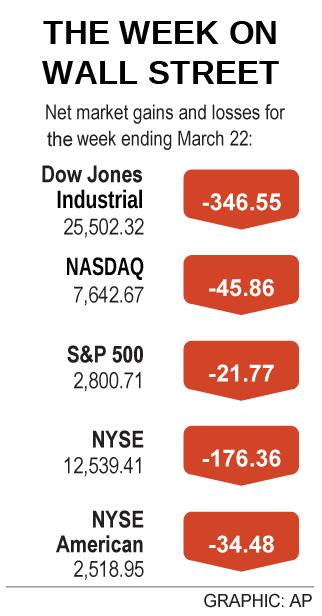Wall Street stocks sold off sharply on Friday, with all three major US stock indices posting their biggest one-day percentage declines since Jan. 3 as weak factory data from the US and Europe led to an inversion of US Treasury yields, fueling fears of a global economic downturn.
Capping five tumultuous days of trading, the S&P 500, the Dow Jones Industrial Average and the NASDAQ Composite were all down for the week.
A weaker-than-expected reading of US factory activity this month, along with similarly dour reports from Europe and Japan, helped send US Treasury yields into an inversion, with the spread between yields of three-month Treasury bills exceeding those of 10-year notes for the first time since 2007.

An indication of near-term risk, and seen by many as a potential harbinger of recession, the inverted Treasury yield curve seemed to confirm investor fears of a global slowdown in economic growth.
“To some extent, what’s going on with the yield curve has been exaggerated,” said Bernard Baumohl, managing director and chief global economist at the Economic Outlook Group LLC in Princeton, New Jersey. “I would not leap to the conclusion that an recession is imminent.”
However, Baumohl warned against complacency.
“There are real clouds that are forming on the horizon. The question is how dark are those clouds going to be and will they trigger a recessionary storm,” he said.
Earlier in the week, the US Federal Reserve concluded its two-day monetary policy meeting with a statement that forecast no additional interest rate hikes this year on signs of economic softness, a dovish shift that took the markets by surprise.
Interest rate-sensitive financial firms fell 2.8 percent, capping their worst week since a sell-off in late December last year.
The Dow Jones Industrial Average fell 460.19 points, or 1.77 percent, to 25,502.32, the S&P 500 lost 54.17 points, or 1.90 percent, to 2,800.71 and the NASDAQ Composite dropped 196.29 points, or 2.5 percent, to 7,642.67.
Of the 11 major sectors in the S&P 500, all but utilities ended the session in the red.
For the week, the Dow Jones lost 1.34 percent, the S&P fell 0.8 percent and the NASDAQ slid 0.6 percent.
The CBOE Volatility Index, a gauge of investor anxiety, on Friday jumped the most in two months.
Nike Inc shares dipped 6.6 percent after the sportswear company’s North American sales fell short of estimates.
Luxury retailer Tiffany Inc said it expected earnings growth to resume in the second half of the year and affirmed its fiscal targets for this year, sending its shares up 3.1 percent.
Electric automaker Tesla Inc slid 3.5 percent following a research note from Cowen Inc that saw soft US demand for the Model 3 until the release of the company’s lower-priced model in the second quarter.
Boeing Co continued to fall, losing 2.8 percent as Indonesian airline Garuda canceled a US$6 billion order for the company’s 737 MAX planes, citing customer fear in the wake of the Ethiopian Airlines crash.
Netflix Inc dropped 4.5 percent on the eve of Apple Inc’s launch of a rival streaming service tomorrow.
Declining issues outnumbered advancing ones on the New York Stock Exchange by a 3.69-to-1 ratio; on NASDAQ, a 4.90-to-1 ratio favored decliners.
The S&P 500 posted 54 new 52-week highs and five new lows; the NASDAQ Composite recorded 25 new highs and 87 new lows.
Volume on US exchanges was 8.66 billion shares, compared to the 7.71 billion average over the past 20 trading days.

Intel Corp chief executive officer Lip-Bu Tan (陳立武) is expected to meet with Taiwanese suppliers next month in conjunction with the opening of the Computex Taipei trade show, supply chain sources said on Monday. The visit, the first for Tan to Taiwan since assuming his new post last month, would be aimed at enhancing Intel’s ties with suppliers in Taiwan as he attempts to help turn around the struggling US chipmaker, the sources said. Tan is to hold a banquet to celebrate Intel’s 40-year presence in Taiwan before Computex opens on May 20 and invite dozens of Taiwanese suppliers to exchange views

Application-specific integrated circuit designer Faraday Technology Corp (智原) yesterday said that although revenue this quarter would decline 30 percent from last quarter, it retained its full-year forecast of revenue growth of 100 percent. The company attributed the quarterly drop to a slowdown in customers’ production of chips using Faraday’s advanced packaging technology. The company is still confident about its revenue growth this year, given its strong “design-win” — or the projects it won to help customers design their chips, Faraday president Steve Wang (王國雍) told an online earnings conference. “The design-win this year is better than we expected. We believe we will win

Chizuko Kimura has become the first female sushi chef in the world to win a Michelin star, fulfilling a promise she made to her dying husband to continue his legacy. The 54-year-old Japanese chef regained the Michelin star her late husband, Shunei Kimura, won three years ago for their Sushi Shunei restaurant in Paris. For Shunei Kimura, the star was a dream come true. However, the joy was short-lived. He died from cancer just three months later in June 2022. He was 65. The following year, the restaurant in the heart of Montmartre lost its star rating. Chizuko Kimura insisted that the new star is still down

While China’s leaders use their economic and political might to fight US President Donald Trump’s trade war “to the end,” its army of social media soldiers are embarking on a more humorous campaign online. Trump’s tariff blitz has seen Washington and Beijing impose eye-watering duties on imports from the other, fanning a standoff between the economic superpowers that has sparked global recession fears and sent markets into a tailspin. Trump says his policy is a response to years of being “ripped off” by other countries and aims to bring manufacturing to the US, forcing companies to employ US workers. However, China’s online warriors